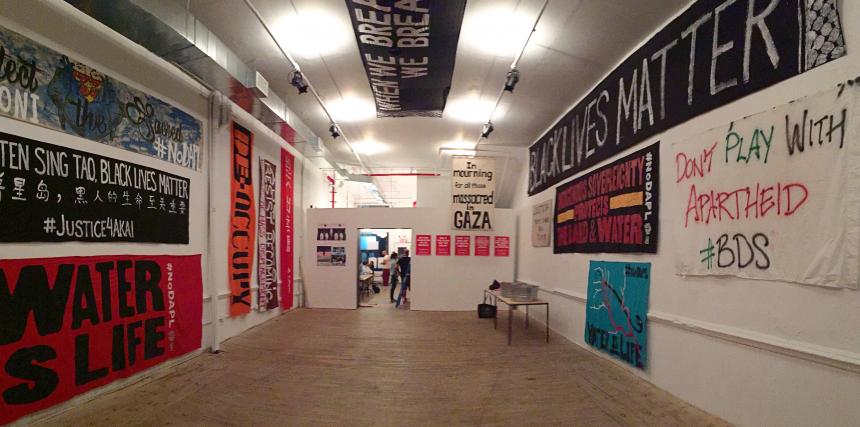This is the first in a series of blogs about the movement response to COVID-19.
*Photo credit: Hrag Vartanian
I arrived at the Center for Constitutional Rights to start a new job in the midst of one of the greatest public health crises of the past 20 years. Over the past three weeks, there has been both an incredible wave of mass movement organizing as well as disappointing responses from the federal government in the face of COVID-19. The period we have entered is frightening, but it is also clarifying. I am deeply privileged to be able to work remotely and receive healthcare; it’s important to name that this is not the reality for so many others in this nation.
In the past month alone, millions of people have become unemployed in what is now the largest economic collapse since the Great Depression. The deadliness of race and class oppression has become all the more apparent in the midst of this pandemic; preliminary data show that Black Americans are disproportionately dying from COVID-19. While it is easy to dismiss these deaths as only being rooted in health “comorbidities” like hypertension or diabetes, it is much more accurate to look at the systemic ways in which generational poverty, medical bias, and racism leave Black and Brown communities particularly vulnerable to living shorter lives than white people. These are just a few incidents at this moment that show both the deep immorality and inability of the U.S. government to correctly take care of its citizens: preventing pandemics is not profitable—and, therefore, not possible—under free-market capitalism.
This pandemic has proven to me yet again that our dreams and desires to liberate our people from this system are both morally and materially correct: COVID-19 is exposing the deep inequities and needs that our people have been bearing witness to for generations.
All of us at the Center for Constitutional Rights are in deep relationships with grassroots movements. Many of our collaborators and co-conspirators have organized mutual aid networks and support funds that have been on the frontline of emergency community care strategies since weeks before the federal government passed legislation. Our movement partners have also generated thoughtful policy platforms and priorities that center the needs of the communities most vulnerable. Here are just a few of the policy demands that I find most inspiring:
Decolonize This Place is calling for universal healthcare, suspended work obligations, moratoriums on rent, mortgages, and evictions, the abolition of bail, and the opening up of unoccupied homes.
The Movement for Black Lives created a policy platform rooted in the liberatory Black radical tradition that calls for economic relief for workers, prison abolition, housing rights, voting rights, and universal healthcare.
North Carolina’s People’s Platform for Social and Economic Survival and Beyond is a collaborative vision from many grassroots organizations across the state that declares housing, nutrition, healthcare, democratic participation, and economic relief for working families as universal human rights.
Free Them All for Public Health is organizing through a prison abolitionist framework to remind us that prisons, jails, detention centers, policing, and surveillance have always been public health emergencies to our communities.
The People’s Bailout calls for the centering of the most marginalized people in this country who are most likely to bear the economic burden of this pandemic: low-wage workers, family farmers, poor Black and Latinx communities, Indigenous peoples, incarcerated people, people experiencing homelessness and housing insecurity, and undocumented immigrants.


